#farm labor camp
Photo

@kensingtonbooks Check out this #newrelease #thesaintsofswallowhill by @donnaeve2! #novel #greatdepression #new #courage #survival #friendship #turpentiners #labor #farm #hardwork #dangerous #orphanage #negligence #camp #isolated #pain #past #redmeption #friendships #beauty #newlife #newbeginnings #mustreadbook #recommended #Amazon #goodreadschallenge2022 #bookblogger #reviewer https://www.instagram.com/p/ChLgg6Hryzl/?igshid=NGJjMDIxMWI=
#newrelease#thesaintsofswallowhill#novel#greatdepression#new#courage#survival#friendship#turpentiners#labor#farm#hardwork#dangerous#orphanage#negligence#camp#isolated#pain#past#redmeption#friendships#beauty#newlife#newbeginnings#mustreadbook#recommended#amazon#goodreadschallenge2022#bookblogger#reviewer
0 notes
Text
"Janet Wilkerson had a problem. As vice president of human resources for Peterson Farms Inc., she was having trouble filling the overnight shift at her chicken processing plants. The hours were long. The pay was low. And there never seemed to be enough workers."
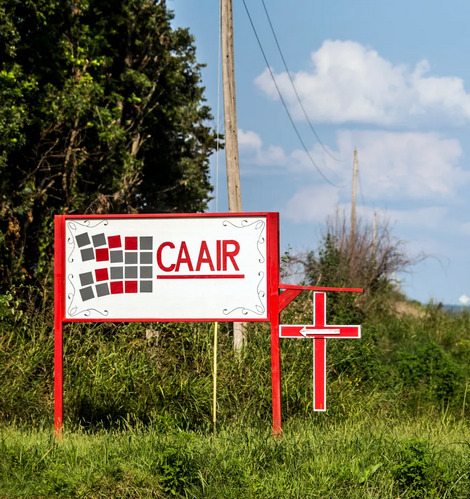
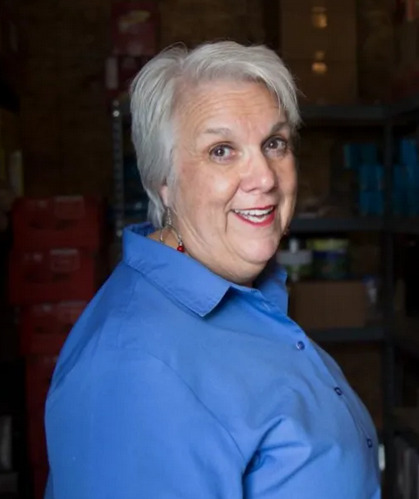
"It was a slave camp."
“We felt like nobody had ever listened to us,” said one of the plaintiffs, Lucas Miller-Allen, when reached by phone today. “When all of our drug courts send us there, it’s like you don’t exist. It feels like you’re forgotten, like you’re thrown away. Like slavery. You’re dreading waking up each day, working for free, for nothing.”
But Janet Wilkerson was having trouble filling work shifts at her chicken processing planet, and she doesn't now.
Judges in Oklahoma are still sending her men to work for free. The "rehab program" keeps their wages and workers-comp for injuries on the job.
The above stories are from 2017.
OPINION AND ORDER by Judge Terence Kern ; dismissing/terminating case ; granting (Document 131) Motion to Dismiss for Lack of Jurisdiction
U.S. District Court for the Northern District of Oklahoma / Copeland eta v. C.A.A.I.R et al
This is from 2022:
CAAIR, as it is commonly known, began more than a decade ago sending residents to work at Simmons Foods Inc., a processing giant that Walker touts as a principal partner and supplier to his distributorship, Renaissance Man Food Services. State judges assigned convicted offenders to CAAIR, giving them a choice between the residential program and its requirements or serving time in conventional jails or prisons. Simmons would then contract with CAAIR for labor at its plants; CAAIR program participants were not paid.
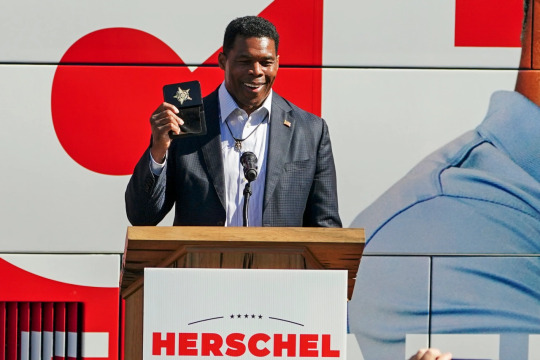
Herschel Walker, who was Donald Trump's preferred Republican candidate for the 2022 US Senate election in Georgia, appears to be one of those "Christian businessmen" who profits from the free labor provided by CAAIR.
#CAAIR#Janet Wilkerson#slave camp#modern slavery in the US#Renaissance Man Food Services#Peterson Farms Inc#Herschel Walker
295 notes
·
View notes
Text
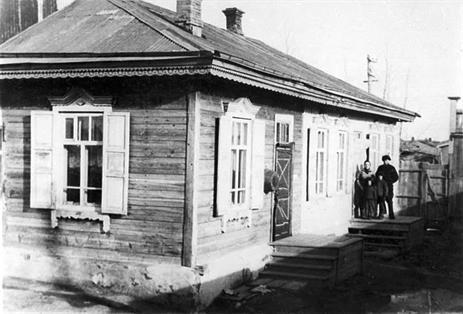
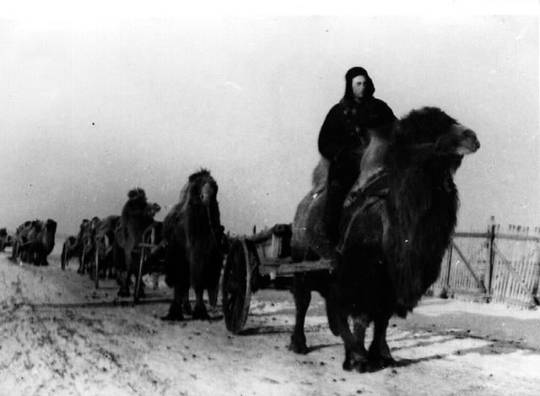
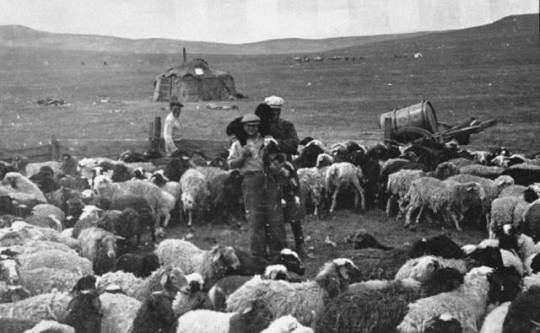


The Litvin family - Jewish farmers from Hailar, Manchuria, Chinese Inner Mongolia region
The Litvin family was originally from Irkutsk, Siberia. Life for Jews became increasingly harder there during WWI, so the family moved to Inner Mongolia where the existence of the Chinese Eastern Railway made the pastoral area promising.
The family patriarch, Simeon Litvin, was a very skilled farmer. He could accurately determine the age of a horse by its teeth and learned to speak the Mongolian and Tungus languages when communicating with Buryat and Tungus people. So when the family settled in the small town of Hailar on the CER, Simeon quickly made himself at home and gained friends among his suppliers, while still observing Jewish holidays, not working on Saturdays and regularly visiting the Hailar synagogue.
The situation changed dramatically when the Japanese occupied Manchuria in the early 1930s and established the puppet state of Manchukuo, after the Soviet Union sold its part of the railroad to the them. Japanese troops and police became increasingly aggressive, attacking, insulting, and even raping private citizens. They ruthlessly beheaded captives without trials and put their heads on public display. Chaim Litvin, the son of Simeon, had to endure brutal torture and years of imprisonment in a labor camp. After the prison was liberated, Chaim hurried home to Harbin, covering 700 kilometers in only three days. There, he began to breed cattle, got married and built a large farm together with his wife. Chaim worked until in 1959, in the People’s Republic of China, everything was confiscated. With the threat of being arrested by the Communist regime, he went with his family to Israel in 1962.
160 notes
·
View notes
Text
Quick-Fire Headcanons (10)
Solomon and Barbatos always reference something obscure when they choose their costumes.
Beel get strangely competitive when it comes to carnival/amusement park games.
Levi’s favorite part of any tabletop game is exploring the environment his character is in.
Asmo has been caught numerous times sleeping in class.
Mammon and Asmo both make up elaborate and unique excuses for why they couldn’t make it to a certain event.
Simeon has to pretend he hates tragedies.
Lucifer has to pretend he loves tragedies.
Asmo has a really hard time letting go of the past.
Satan keeps a journal in order to deal with his emotions in a non-destructive way.
As much as he knows he’s going to have to write one eventually, Simeon does not want to publish an autobiography or memoir for his human world alias.
Solomon has been asked to take part in a top secret project that required him to act as a double agent in order to get information on two warring clans in the Devildom.
Lucifer sometimes forgets that Cerberus is far from being a small dog.
Beel wishes he could have a farm in the human world because he thinks he would enjoy the manual labor involved.
Satan wishes he could volunteer or work at an animal clinic or shelter but knows he would get way too attached to the animals in order to do his job properly.
The concept of pets is foreign in the Celestial Realm, so when they are staying in the human world, Luke begs Simeon for an animal companion (but Simeon really isn’t interested in getting one, so he has to find creative ways of letting Luke down easy).
Once he learns about it, Asmo becomes obsessed with astrology and will look at everyone’s horoscopes.
Levi is creeped out by space, whereas Satan is creeped out by what’s in the ocean.
Asmo and Lucifer have been known to camp outside a theater together in order to see the opening performance.
Solomon and Belphie will hit the discount cinemas together to make fun of dumb B-rated movies.
Lucifer, Barbatos, and Diavolo share a love for musicals.
Simeon remains polite during arguments or debates, but that doesn’t mean he won’t utterly destroy his opponent; it just means that he won’t succumb to low blows and name-calling.
Lucifer and Solomon are not always sincere in their apologies (with the exception of MC) but feel like they are necessary in order to continue moving forward and getting work done.
Diavolo and Mammon both like driving with their music on full blast and the windows down.
#obey me shall we date#obey me mc#obey me lucifer#obey me mammon#obey me asmo#obey me asmodeus#obey me brothers#obey me satan#obey me levi#obey me leviathan#obey me side characters#obey me simeon#obey me diavolo#obey me belphie#obey me barbatos#obey me belphegor#obey me beel#obey me beelzebub#obey me solomon#obey me lord diavolo#obey me luke
143 notes
·
View notes
Text
While sugarcane has defined Caribbean islands since the onset of European settler colonization, a little-known African species, guinea grass, has invaded sugar plantations from within. Cultivated to intensify sugar production, guinea grass ironically became a weed of the plantations while providing material and spiritual resources to enslaved and marooned Africans and their descendants. [...]
While sugarcane was imported from Austronesia, guinea grass hails from the western coast of Africa. Sugar was the principal crop of many Caribbean plantations; guinea grass was imported as fodder for the oxen that labored in the fields and for the cattle that fed the planters. [...]. A 1707 account by Hans Sloane, whose collections would form the core of the British Museum, describes the grass (then known as “Scotch grass”) as widespread in Barbados and Jamaica [...].
The imported grass was celebrated by eighteenth- and nineteenth-century planters for its high grazing quality. Bryan Edwards sang its praises in Jamaica, writing that it may be considered as next to the sugar-cane, in point of importance; as most of the grazing and breeding farms or pens throughout the island were originally created, and are still supported, chiefly by means of this invaluable herbage. For Edwards, guinea grass had an almost equal status to sugar cane because it could feed “the plenty of horned cattle both for the butcher and planter.” [...] By 1786, the African grass had become naturalized in Guadeloupe, and, by 1813, it had reached Mississippi, writes Parsons. It spread widely throughout Central and South America [...].
Indeed, one observer in New Granada (modern-day Colombia) was so enthusiastic as to argue that whoever had introduced the plant deserved a statue “as high as New York’s Statue of Liberty” [...].
In Cuba, the grass appears in an 1816 report of José Antonio de la Ossa, the first director of the Botanical Garden of Havana, who wrote: “It is an abundant and convenient pasture grass, because it multiplies its stalks in the same way as Sugar cane[.]”
Like Sloane and Edwards, Ossa compares guinea grass to sugarcane. The two foreign grasses seemed to them similar in morphology and function, because they both [...] promoted the economic development of the islands’ cash crop societies. [...] While sugar was introduced to Cuba long before guinea grass, it was guinea grass that allowed for the intensification of Cuban sugar cultivation with large herds of oxen.
---
Yet something strange happened in the history of this ostensibly symbiotic relationship.
Although guinea grass was meant to support the sugar economy by feeding its beasts of burden, ironically, it became a virulent weed to the sugarcane plants. By 1977, guinea grass was rated the number one weed to sugarcane in Cuba. In 2012, the journal of the National Botanical Garden of Cuba (Revista del Jardín Botánico Nacional) listed it as [...] an invasive species of greatest concern. In this way, the two imported grasses became stalky antagonists in the daily competition for light, water, and soil nutrients.
Their cultural meanings, however, had long since diverged. If sugarcane supported the economic interests of European planters, guinea grass was appropriated by enslaved and marooned Africans across the Caribbean for practical and religious purposes.
Diasporic Africans in the Virgin Islands used the dried grass to make masquerade costumes for Carnival and other festivals. In Cuba, priests used it to make omiero, [...] of the Afro-Cuban Reglá de Ochá religion.
Moreover, some of the enslaved canecutters used an ancestral West African technique to thatch their mud huts with guinea grass. [...] In fact, the famed maroon Esteban Montejo described using this method of thatching during his escape from a Cuban sugar plantation in the late nineteenth century: [...] I had never left the plantation before. I walked uphill, downhill, in every direction. [...] My feet were blistered and my hands were swollen and festering. I camped under a tree. I made myself a shelter of guinea grass in a few hours and I stayed there four or five days. [...]
Guinea grass has continued to take on new meanings for Caribbean writers in the twentieth and twenty-first centuries. In Alejandro Aguilar’s 1997 short story “Landscape of Clay,” [...] [t]he untamed grass, like the cadets’ expressions of sexuality, subverts the rigid structure of the institution. Likewise, the storyteller in the 2002 play In the Time of the Revolution by the Guadeloupean writer Maryse Condé bemoans the fact that “people’s dreams are not made to grow freely like guinea grass on the banks and highways. Some people try to pull them up, to mow them down, to dry them out, to burn them and see them go up in smoke.” [...] In undermining the economic ambitions of the plantation system, guinea grass has come to represent acts of subversion [...].
---
All text above by: Hannah Rachel Cole. “Plant of the Month: Guinea Grass.” JSTOR Daily. 1 December 2022. [Bold emphasis and some paragraph breaks/contractions added by me.]
80 notes
·
View notes
Note
hello there I Have a request for you .
so could you do headcanons of how the cookies would react to reader (gn) trying to get a GIGANTIC vegetable out of the ground
(like a potato or a white radish you choose)
You can take as much time as you need to
And have fun!
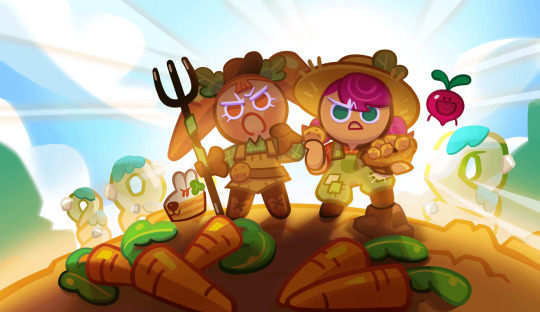
Po-tay-to, Po-tah-to (Carrot, Beet, Spinach, Rambutan Cookie)
Vegetable gang rise up.
You yawned and stretched your limbs when the morning rays brightened up your room. You gathered your farming gear and attire before marching out of your home, readying to collect the spoils of your labor.
Ah, the fresh smell of fruits and veggies, grown by none other then yourself, you made sure the plants were well watered and planted with good fertilizer for maximum results. You had Carrot Cookie to thank for giving you tips on farming, even getting hands on herself with planting your crops.
You agreed with her, god you loved agriculture.
You spent the morning collecting the crops that were ready to be picked, until you came across this particular potato stem within the ground. You reached down, gripped the stem, and pulled!
Huh?
It…wasn’t moving? You tried lifting it up harder, but it would barely budge. You tried once last time with all your might to pull it out of the ground, only for your grip to slip from the stem, making you fall backwards.
This was quite the pickle! You grabbed your shovel and chose to dig the potato out of the ground, it was ripe for the taking and you weren’t going to let it spoil. Imagine your shock when you had to walk a little away just to dig against the side of the now massive potato in the ground.
This was certainly going to take all day. Oh well, let’s get to work!
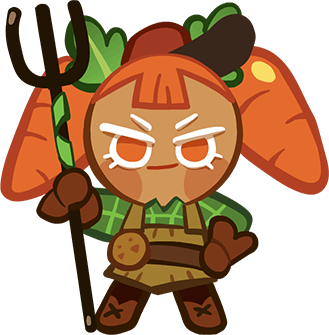
“Holy moly, that potato is massive, Y/N Cookie!”
If there was a cookie who’s familiar with giant vegetables in the past, it was Carrot Cookie! So when she stopped by to see how your farm was doing, she was more then happy to help out with your potato problem.
Digging was a slow process, but with two cookies, it does go by faster then with one. All the while, you two chatted up a storm about vegetables, giving each other farming tips, etc.
Farming really did a number on you in terms of physique, your dough was firm and crisp, it was really noticeable when you removed your farming outfit for a moment to fan yourself in the baking sun. Not that Carrot was looking or anything!
You both were finally able to dig below enough to easily pull out the gigantic potato from the ground with the help of your truck with a tow. Carrot was marveling at how great the potato looked, she gave you a lot of praise for it!
You celebrated by taking a picture with her, your hand on her shoulder and hers on yours. #Farmers4life

“Oh…that’s a pretty big potato.”
Beet Cookie was a common camper at your farm, usually here then over there at Carrot’s farm. Beet was just more comfortable with you on that.
She didn’t have the heart to pick at your crops without permission and you appreciated that. Hence why when she noticed a particular large mound of dirt amongst your potatoes, she’d let you know.
Working hard, she admits she glanced a little bit at your crispy dough that baked under the sun, she had to pull her hat down to hide her blushing face.
When the potato is finally dug out, you celebrated by making the best gosh darn mashed potatoes Beet’s ever tasted. Her eyes twinkled when she took a bite out of it, yep, this was worth the effort today!
Beet was always welcomed at your farm, camping where she pleased. You’ll even offer the bed in your guest room for her to sleep in, and while she does say camping is more her style..she doesn’t mind sleeping in a bed. Can she sleep on yours though?
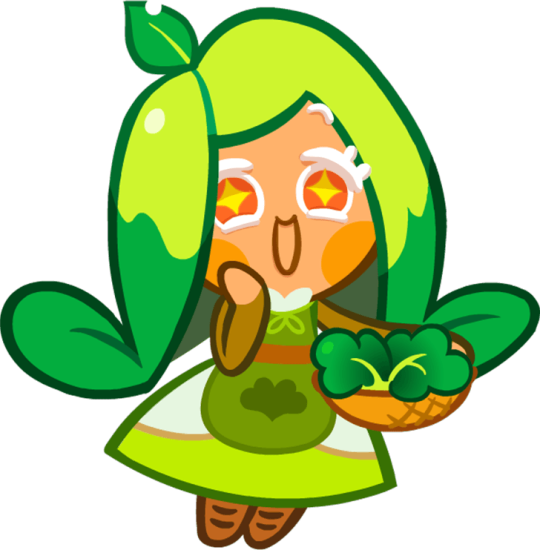
“Me...? Strong? Hehe, stop teasing me! But I’m more then happy to help you!”
With Spinach Cookie, it’s pretty much over. Her strength was substantial, able to visibly shift the potato within the ground.
With enough time and moving space from the dirt, she was able to pull the potato from the stem from the ground!
You gave her your best produce for the today and portion of the potato, of which she happily accepted.
Then she chose to hug you tightly. You had enough of your own strength to at least reciprocate it, but damn did this woman have a grip on you.

“Need to pull out that potato? I’ll do my best to help!”
You figured that in order to pull this potato out of the ground, you were gonna need a strong cookie for the job, and who better then Rambutan Cookie. She hid her blush when you praised her like that, she’ll do her best to be the cookie you thought of her to be.
She was caught off guard by how massive the potato was, but she didn’t want to disappoint you, so she’ll do whatever she can to help you out!
With your digging around the potato and her pulling on the stem, you both made progress throughout the day. She complimented your fields, those veggies and fruits sure were tasty! You complimented her in return, then she was backing to being a blushing mess.
You gave her your best pickings once the job was done, even threw in little extra somethings for her village. She couldn’t thank you enough and hugged you, it wasn’t as powerful as Spinach’s, but it was enough to get the wind out of you!
You’re always welcome at her village if you ever stop by some time!
#cookie run x reader#cookie run x you#cr x reader#crk x reader#cookie run kingdom x reader#cookie run#cookie run kingdom#cookie run ovenbreak#cookie run ovenbreak x reader#crob x reader#crob#female x reader#carrot cookie#fanfic#beet cookie#spinach cookie#rambutan cookie
165 notes
·
View notes
Text
i think my parents sent me to wilderness therapy when i was a teen. i went to this “troubled teen girl camp” in new hampshire and they woke us up at 5AM so all us 12-17 year old girls could feed the herd of 80 horses. then we spent the day doing farm labor. also the only bathroom facility was an outhouse in the woods and we were only allowed to bathe in the lake once a week. i didn’t consider this was wilderness therapy until i told someone about how i remember being so hungry i’d eat the bran mash for the horses. they said Meghan That Is Not A Normal Camp Experience
#i really liked hanging out with the horses tho#i wasn’t gooned i went willingly#i rly hated the outhouse and being dirty tho
20 notes
·
View notes
Text
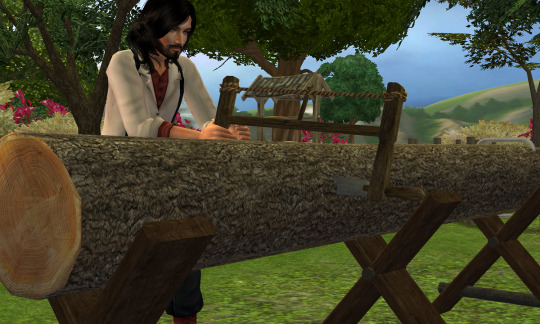

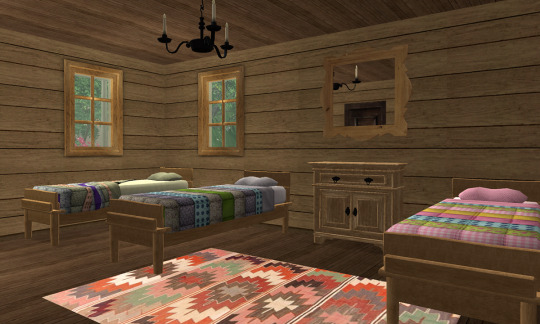
Unlike me, Wilhelm Kohler is rarely surprised by his wife. Her choosing him was the most surprising thing he could have imagined, so anything after that just seems in character. They couldn't be more unpredictable: she's a rich girl from Boston with WASP ancestry and hands better for lacework than hard labor; he's a working class immigrant from Gernsbach, Germany, who took his knowledge of the Black Forest to logging camps in Maine, the Catskills, Appalachia, and finally, the Rockies.
He didn't even mean to end up on Antoinette Benoit's wagon to Kainai--he just thought it might mean work. And it has, though maybe not in the way he expected. He's put his woodworking knowledge to use building beds and a roof for his children, a table for his kitchen, and a storefront for his wife to sell her pretty things. And that's not just talk--all the furniture that can be made with Sun&Moon's Woodworking set has been. Just like my dad, woodworking is Wilhelm's love language.
His greatest pride, though, was helping build the schoolhouse. Reading came late for Wilhelm, particularly reading English, and though it means fewer hands on the farm, he's glad to know his children stand a chance of being half as well-read as his wife.
#kainai homestead#homestead challenge#historical sims#ts2#the sims 2#wilhelm loves eva#i also love eva#can you tell#no pics of the shop because i want to renovate it#and who knows how long that will take
26 notes
·
View notes
Note
hi im trying to learn more abt north korean refugees from the korean war or more generally conditions in north korea during the war and its been like...rly challenging to find resources since the search engines will conflate them with defectors and what resources i do find tend to be "there were north koreans refugees. there were alot...a lot of them died...some did not" and not about why they fled or what was happening in north kroea at the time. i can make inferences from what i do know, but i was wondering if you had any resources or recommendations on where i could look since ive found ur dprk resources super informative & helpful in the past!
hello!
during the war, there was not yet a concept of a korean person being from the north or the south and that's probably a reason why you can't find specific resources if you're searching in that direction. generally, refugees fled to manchuria, china, russia, and japan. they tried to farm in these regions, tried to become educated and learn skills and crafts, and/or were part of anticolonial organizing efforts. the migrations to these areas began much before the war and there were sizable korean populations in these regions as early as the late 1800s and the 1910s.
a notable example is find very interesting is that there were enough communist koreans in russia and climbing the political ranks of the government at the beginning of the 20th century that in 1937, stalin had every korean person rounded up and sent to central asia (kazakhstan, uzbekistan, etc) under suspicion of them being japanese spies. which i personally think inspired the US to create japanese internment camps.
my understanding is that the borders to manchuria and china were not heavily enforced before the war and military occupation of the area so it was very common for people in the northern areas of the korean peninsula to travel back and forth for trade and live across the border for agricultural conditions.
for wartime conditions in the region, the northern half of the peninsula was bombed more severely than the southern half and the southernmost tip of the land is the only area where the trees on mountains are the original ones and not newly planted after the war (usually by the park chunghee administration). agriculture is more difficult in the north because of the terrain and the majority of the flat and fertile farming soil is in the jeolla province so the north was more likely to develop communist style industry, so the U.S. focused on flattening any man made infrastructure in the area. many people fled across borders and many people hid in caves in the mountains because the peninsula is very mountainous with many caves. for resources, i don't have anything more specific than what's already in my dprk tag! check the dprk study guide for further reading.
overall, many people fled korea from the late 1800s to after the war in the 1950s because of japanese labor exploitation and cultural persecution, artificially produced famine conditions because of japanese resource exploitation and then the effect of the U.S. bombings on the environment, and the sheer death and destruction of the bombings and ground military troops.
hope this is helpful and lmk if u have more specific questions i can answer!
18 notes
·
View notes
Text
"Disabled people have always been among the chief intended targets of all forms of incarceration, representing the largest marginalized population in jails and prisons (and almost one hundred percent of those confined in other locked institutions). Disabled people are disproportionately represented in jail/prison for two main reasons. First, the criminal legal system targets and disadvantages disabled people at every phase of the criminal legal process, and second because carceral institutions are disabling by design (so those who enter jail, prison and other locked institutions without disabilities almost assuredly acquire disabilities while incarcerated).
...There are undeniable similarities, connections and overlays between Black Codes, Indian Removal and Appropriations Acts, Jim Crow, manumission, Public Charge Laws; unsightly beggar ordinances, anti-tramping, anti-solicitation and anti-vagrancy laws; and convict leasing, vendue, sharecropping, peonage, sheltered workshop and modern prison labor systems. The interchangeable and often indistinguishable sites where those targeted by these laws and systems inevitably find themselves — often cyclically — reveals the ease with which powerholders leverage ableism to categorize and (re)distribute marginalized people into and across carceral institutions on the basis of purported health, criminality and vulnerability. Some of these places include: plantations, stockades, privately owned and operated “homes,” and “houses of corrections” (i.e., jails/prisons); poor houses, workhouses, poor farms and homeless “shelters”; asylums, county infirmaries and prison hospitals; reservations, boarding and residential “schools,” orphanages and boot camps, among others. While the stated purposes of these institutions and practices always includes a positive spin (e.g., aid, treatment, cure, rehabilitation, correction, discipline, vocational skills development and proving, etc.), all are carceral regardless of their euphemistic name or stated benevolent rationale or claim. This is the backdrop against which we must understand and challenge eugenics like that proposed by Mayor Adams and other government officials nationwide." (Talila Lewis from an interview with George Yancy at Truthout).
Read this amazing article diving into incarceration and ableism from Talila Lewis who is an incredible activist and scholar.
129 notes
·
View notes
Text
Atrocities US committed against PRISONERS
The US currently operates a system of slave labor camps, including at least 54 prison farms involved in agricultural slave labor. Outside of agricultural slavery, Federal Prison Industries operates a multi-billion dollar industry with ~ 52 prison factories , where prisoners produce furniture, clothing, circuit boards, products for the military, computer aided design services, call center support for private companies.
Ramping up since the 1980s, the term prison–industrial complex is used to attribute the rapid expansion of the US inmate population to the political influence of private prison companies and businesses that supply goods and services to government prison agencies. Such groups include corporations that contract prison labor, construction companies, surveillance technology vendors, companies that operate prison food services and medical facilities, private probation companies, lawyers, and lobby groups that represent them. Activist groups such as the National Organization for the Reform of Marijuana Laws (NORML) have argued that the prison-industrial complex is perpetuating a flawed belief that imprisonment is an effective solution to social problems such as homelessness, unemployment, drug addiction, mental illness, and illiteracy.
The War On Drugs, a policy of arrest and imprisonment targeting minorities, first initiated by Nixon, has over the years created a monstrous system of mass incarceration, resulting in the imprisonment of 1.5 million people each year, with the US having the most prisoners per capita of any nation. One in five black Americans will spend time behind bars due to drug laws. The war has created a permanent underclass of impoverished people who have few educational or job opportunities as a result of being punished for drug offenses, in a vicious cycle of oppression.
In the present day, ICE (U.S._Immigration_and_Customs_Enforcement), the police tasked with immigration enforcement, operates over 200 prison camps, housing over 31,000 undocumented people deemed “aliens”, 20,000 of which have no criminal convictions, in the US system of immigration detention. The camps include forced labor (often with contracts from private companies), poor conditions, lack of rights (since the undocumented aren’t considered citizens), and forced deportations, often splitting up families. Detainees are often held for a year without trial, with antiquated court procedures pushing back court dates for months, encouraging many to accept immediate deportation in the hopes of being able to return faster than the court can reach a decision, but forfeiting legal status, in a cruel system of coercion.
Over 90% of criminal trials in the US are settled not by a judge or jury, but with plea bargaining, a system where the defendant agrees to plead guilty in return for a concession from the prosecutor. It has been statistically shown to benefit prosecutors, who “throw the book” at defendants by presenting a slew of charges, manipulating their fear, who in turn accept a lesser charge, regardless of their innocence, in order to avoid a worst outcome. The number of potentially innocent prisoners coerced into accepting a guilty plea is impossible to calculate. Plea bargaining can present a dilemma to defense attorneys, in that they must choose between vigorously seeking a good deal for their present client, or maintaining a good relationship with the prosecutor for the sake of helping future clients.
European countries. John Langbein has equated plea bargaining to medieval torture: “There is, of course, a difference between having your limbs crushed if you refuse to confess, or suffering some extra years of imprisonment if you refuse to confess, but the difference is of degree, not kind. Plea bargaining, like torture, is coercive. Like the medieval Europeans, the Americans are now operating a procedural system that engages in condemnation without adjudication.”
A grand jury is a special legal proceeding in which a prosecutor may hold a trial before the real one, where ~20 jurors listen to evidence and decide whether criminal charges should be brought. Grand juries are rarely made up of a jury of the defendant’s peers, and defendants do not have the right to an attorney, making them essentially show-trials for the prosecution, who often find ways of using grand jury testimony to intimidate the accused, such as leaking stories about grand jury testimony to the media to defame the accused. In the murders of Michael Brown, Eric Garner, and Tamir Rice, all of whom were unarmed and killed by police in 2014, grand juries decided in all 3 cases not to pursue criminal trials against the officers. The US and Liberia are the only countries where grand juries are still legal.
The US system of bail (the practice of releasing suspects before their hearing for money paid to the court) has been criticized as monetizing justice, favoring rich, white collar suspects, over poorer people unable to pay for their release.
On Jan 26th, In Mississippi state penitentiary, an inmate was found hanging in his cell, in a string of deaths in the prison. This is the 12th death within a single month.
A photo surfaced of a November 2019 training class for prison guards in west virginia, showing 34 trainees doing a nazi salute. Only 3 people have been fired. A large number of prison workers, and populations in prison towns, are white supremacists.
A black-site interrogation warehouse in Chicago called Homan Square is notorious for the sexual abuse, torture, and disappearances of its prisoners. The main interrogator, Richard Zuley, applied torture techniques he learned at Guantanamo Bay at Homan Square.
On Oct 25, 2014, a mentally ill inmate, Michael Anthony Kerr, at the Alexander Correctional Institution in Taylorsville, NC, died of thirst after being denied water during a 35-day solitary confinement. Prison officials have said since Kerr’s death six months ago that they would investigate the events that led to his death, but no report has been issued and officials have not said when one would be.
On May 23rd, 2014, a mentally ill inmate at a Dade County correctional facility near Miami FL was tortured to death by prison guards. Darren Rainey was serving a two-year sentence for cocaine possession when he was forced into a locked shower by prison guards as punishment for defecating in his cell, says one inmate. Once Rainey was inside the shower, guards blasted him with scalding hot water as he begged for his life. Investigators determined that there was not enough evidence to charge the guards.
The Crime Bill of 1994, signed into law by Bill Clinton, increased the size of the US prison industry and dealt with the problem of crime by emphasizing punishment, not prevention. It extended the death penalty to a whole range of criminal offenses, and provided $30 billion for the building of new prisons, to crack down on “super predators”, a term used by Hillary Clinton to refer to remorseless juvenile criminals.
In the 1978 case, Houchins v. KQED, Inc. the Supreme Court ruled that the news media do not have guaranteed rights of access to jails and prisons. It ruled also that prison authorities could forbid inmates to speak to one another, assemble, or spread literature about the formation of a prisoners’ union.
In September 1971, prison guards killed George Jackson, a black Marxist and member of the Black Panthers in San Quentin prison (who had served 10 years of an indeterminate prison sentence for a $70 robbery), after he attempted to free himself and other inmates. Outrage over this, terrible prison conditions, and mistreatment by white prison guards, caused the Attica Prison Riot, in which 33 inmates and 10 prison guards were killed, and sparked dozens of prison riots across the country. In Attica, 100 percent of the guards were white, prisoners spent fourteen to sixteen hours a day in their cells, their mail was read, their reading material restricted, their visits from families were conducted through a mesh screen, their medical care disgraceful, 75% were there as a result of plea bargaining, and their parole system inequitable.
Many companies in the 1800s were guilty of using prison laborers, such as the Tennesee Coal Iron and Railroad Company. In 1891, the prison workers struck and overpowered the guards, and other neighboring unions came to their aid.
#us prisons#us politics#us president#us propaganda#us police#us papyrus#fuck cops#anti capitalism#socialism#anarchy#twitter x#communism#leftism#all cops are bastards#police violence#police state#fuck the police#policing#defund the police#cops#prison#inmate#prisoner#solitary confinement#convict#jail
31 notes
·
View notes
Text
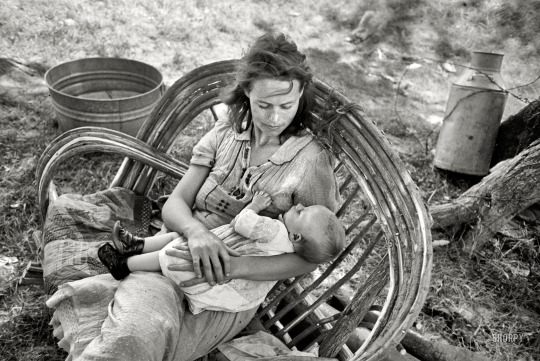
June 1939. "Wife and baby of itinerant cane furniture maker and agricultural day laborer camped in Wagoner County, Oklahoma."
Photo by Russell Lee for the Farm Security Administration
View full size
68 notes
·
View notes
Text
Packaged Deal
Daryl Dixon x Reader
Content warnings: Fighting, swearing, gunshot wound, death, all that fun stuff
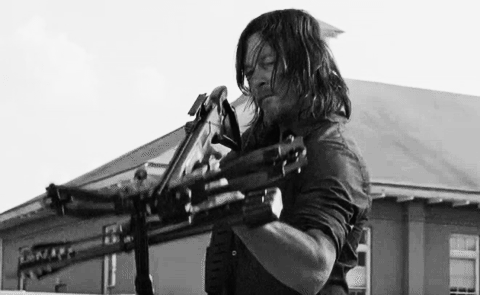
It had always been Daryl and Y/N, they where a pair, a packaged deal. Through the twists and turns of life, through every war, walker and supply run, they found their way back together, and this supply run wasn't any different. The rumbling of his motorcycle's engine and the feeling of your arms around his torso where familiar, wind whipping through your hair as you approached your destination, a run down farm supply store another group had spotted a week back, but hadn't had the time to investigate.
You and Daryl dismounted the vehicle and secured your empty bags to your shoulders, ready to retrieve anything and everything from the confined of the slightly dilated building. You both pulled out your crossbow and knifes respectively and marched towards it.
You where thankful the group before had stumbled across such a hidden gem, it had apparently not been a very populated area before the outbreak because the lack of walkers around the area was prevalent. A fact you where grateful for so either of you wouldn't have to waste any energy.
"y/n"
Daryl's voice graveled quietly as you two stepped into the shop.
"don'cha thinks its weird the bell is gone"
After a questioning look you sent him, he pointed above your heads at the door frame, the place bell to alert employees would usual be, it was gone, not unlike someone had unscrewed the mechanism. You shook off the paranoid thought tho, there could be so many reasons it was gone.
"Yeah"
You began to respond "but the place isn't in the best condition, i wouldn't be surprised if it fell off even before the outbreak" Daryl nodded in silent agreement, but still kept the thought in the back of his mind.
Pacing forward your eyes raked across the walls and floor, finally landing on some bags of seeds of the shelves before tossing them into your pack, finding a home on top of the first aid kid you had packed. You planed to plant them in your garden back in Alexandria. A few more items joined the pile, extra fishing line, a hammer and nails, and even a dark grey hunting knife you snagged from box hidden under dust and dead plants. Continuing down the rows of empty shelves and boxed your foot hit something soft on the group, it was a mattress. A few threadbare blankets laid on top of it that you quickly stuffed into your pack, someone must have camped here at the start of the outbreak, judging by the dust that made you sneeze and you lifted up the fabric.
Just as you passed the last aisle to where Daryl was standing examining a spade, a loud noise approached both of you, it was the sound of a loud car driving closer and closer to the store. Catching Daryls eye you both hid behind a large pile of boxes, holding your knifes and crossbow respectively as the engine of the car sputtered to a stop, though voices quickly filled it.
"Dude i swear when i get in there im gunna pass out"
A man grumbled, seemingly younger by the sound of his voice.
"Yeah yeah ill take first watch, but we gotta clean the place up, its been months we don't know if theres biters or rats or shit in there"
Another voice chimed in, deeper this time.
'So people had been camping out here' You thought to yourself as you made eye contact with the man crouching next to you, a concerned look painted on your face. Shifting anxiously a third voice met your ears. You where outnumbers by the sound of it, and you didn't know if they had more on their way.
You scratched your arm absentmindedly, it was an anxious tick you'd always had. Daryl placed his own hand over your, squeezing it slightly in a reassuring manner, the action spoke words he couldn't say, words that would get you two caught my the quickly approaching group of enemies.
"Do yall hear anything? Like breathin or something?"
You freeze, hand coming up to cover your mouth quickly, not noticing how your breath had become slightly labored in anxiety.
"Could just be a breeze Joe, done be so paranoid"
"mm whatever. The man"
Joe grumbled, resuming what seemed to be kicking a small rock down the aisle. The sound of his boots and the stones impact on the ground echoing closer and closer to you and Daryl's hiding spot, until it came into view. He had kicked it too hard to the right, and now it was sitting just next to your frozen form.
As he bent down to pick it up you took your chance, whipping out your knife and holding it against his throat with a steady hand, causing his body to stiffen and looked between you and daryl with wide eyes.
"move, talk, do anything, ill kill you, understand?"
Your voice was quiet but authoritative, a harsh tone that was rarely heard. Joe nodded his head hesitantly. Just as you where steadying yourself to rise from your crouched position his mouth opened.
"ANDY THERES PEOPLE BACK HE-"
His sentence finished with a gurgling sound as you stuck the knife into his throat. Daryl took out his cross bow and you both rose, gazes meeting determinately, you where getting out of here.
The other men quickly ran towards the source of the noise, and after eyeing their friends dead body the glint of revenge in their eyes was piercing, and for a second it was silent.
A searing pain erupted in your shoulder, the feeling spreading like fire all around you body and you firmly grasped where the feeling resided, trying desperately to stop the sensation. You felt a warm liquid covered your hand just as your other senses came into focus, the sound of fighting, the smell of gunpowder, that motherfucker had shot you.
Forcing your self to steady your hands around the grip of your knife you scanned your surrounding. Daryl was fist fighting a man on the floor, his cross bow thrown feet away by his enemy. Your feet scrambled to get close to him, to help him but a force interrupted you. Tackling you to the ground, one of the men pinning your hand with his knees as he threw punches at you.
Thinking as fast as you could in your slightly delirious state and desperate to escape his grasp, you jammed your knee between his legs.
"YOU FUCKIN BITCH"
Howling in pain and yelling profanities it caused his friend to notice the commotion. Whipping out his gun the man who had been attacking daryl not pointed the weapon at him, then he spoke.
"Now no one else here has to die. You just put down your weapons, give us your bags and leave"
With no other choice, Daryl being held at gunpoint, you slowly laid your knife down and painfully adjusting your still bleeding shoulder, dropped your backpack too.
"Good good"
The man waved the gun at the arched in a gesture for him to remove any weapons or supplies as well. Begrudgingly he did, and the enemy kicked his stuff away to the wall with yours.
"Now I said no one has to die.."
He trailed of slightly, holding his gun casual as the other man behind you finally stood up, blocking you from running.
"Buuuuut, you killed Joe" He now pointed his weapon at you, finger on the trigger.
"So your gunna die anyway"
"NO" Daryl suddenly jumped up just as he was about the squeeze the trigger. The archer grabbed him by the side, pushing him down to the ground just as the shot fired. The ringing noise echoed along with the bloody sounds of someone getting shot in the neck.
Slowly turning behind you, the blood splattered onto your already stained clothes and face. The man who had attached you earlier, dead against the wall. Your eyes quickly traced back to where daryl lay, desperately holding his attacker away, his knife beginning to press into his chest.
"Y/N FUCKING RUN" He yelled and you could here the slight edge of desperateness in his voice, he wanted you to get out alive even if he died. But you and daryl where a pair, a packaged deal, and you weren't going to leave him behind just because he told you to.
"NO!"
Lunging at the man above him you knocked the knife out of his hand, with no weapon in yours and not thinking clearly from blood loss and shock you just hit, blows to his face coming without you even recognizing you where throwing them. You didnt stop until a pair of firm but gentle arms wrapped around you, pulling you back from the dead man.
"Shh sunshine its alrigh', just breath its ok"
His gravely voice came from behind you and your heart rate slowed, the pain was catching up to you and a slight whimper left you mouth. Daryl turned you around and held your body to move you away from the dead ones. Brushing your hair out of your face he comforted you.
"Im here, your here, we're ok"
And you where, even with a bullet wound in your shoulder and both of your faces bruised, you where ok, you where together.
"Are you ok?"
Your voice was weak from the screaming you hadnt realized had left your throat before.
"Your shot and your askin me if Im ok?" His mouth tilted up in the slightest ghost of a smile, removing the ripped part of your shirt to asses the damage.
"Well If worry about you Dixon"
His eyes where soft, cleaning the blood from you wound and covering it will all the bandages he could, knowing you wouldn't be able to get proper help until they got back to Alexandria it was all he could do.
"I worry bout you too dumbass, you could have got yourself killed"
"It was for a good cause, I wasn't leavin' you that easy" And you laughed, it hurt like bitch when the sound it echoed through your shoulder but you didn't mind, and he smiled too, so it was worth it.
#twd angst#twd fluff#daryl dixion x reader#daryl dixon#the walking dead#daryl dixon fluff#twd fanfiction
138 notes
·
View notes
Text
The Exile (Part I)
Some time after the rediscovery of the Dragon Isles…
It had been years since Mason had stood outside these walls, raised with his own hands, a labor of love. A home he had reclaimed from Westfall’s ashes, a refuge for the drifters on those once-lush plains who had nowhere else to go. The shacks they raised behind the restored farmhouse remained, sturdier than before, and the small gardens he had planted with them had grown, bright splashes of cultivated life in a fallow land. They should have been dead and gone, with how it all had ended.
Whatever had happened, it had all happened without him, who now stood outside his own fence resting against his spear, hooded cloak pulled over his head to obscure his features, the unkempt beard now streaked with hints of gray doing the rest.
“Anyone ever tell you that you can’t go home again, kid?”
Mason started, snapped back to reality from his reverie. The voice from behind had appeared with no trace, not one grinding footfall in the dust to announce its presence.
The man who had spoken stepped up beside Mason, hands crossed behind his back, and continued, “A beautiful thing, here. I hear the people who’ve been squatting here even have been trading their produce with the squatters in Moonbrook. Hell, some of them I’ve even heard of stopping by Sentinel Hill to chat with those Brigade folks.”
While he spoke, Mason was set at ease somewhat by the drawl native to his own Westfall. Last time he had received a surprise visitor here, it had been the beginning of his exile, his sentence pronounced with the insincerity of those who had only ever dwelt in the halls of power.
“It’d sure be a shame if something were to happen, wouldn’t it? It’s got a future so bright, it positively burns, Mr. Kohler,” the stranger added, turning towards Mason and extending a hand, “You can call me Mr. Auden, by the by, or just Auden if you like.”
Auden had been the name attached to the letter that had called him home, slipped under his tentflap in the Waking Shores, a world away. WIth some hesitation, Mason took the proffered hand. The shake was firm, businesslike, but still carried a certain warmth.
“You sound like a man with something in mind, Mr. Auden,” the exile replied. The men waited there in silence, the only sound the rustling of the wind in dry grass until Mason spoke again, “How’d you find me, anyway? Not like I left much of a trail.”
“Certainly not. As far as most folks know, you died on the Broken Shore. But your kindness always manages to give you away, Mr. Kohler.”
The ragged smith snorted, shaking his head, “You’re telling me you tracked me to a work camp in the Dragon Isles by my kindness? Keep your secrets, then, if you’re not going to give me a straight answer.”
“I assure you, it is a straight answer. Your family knew you were alive, but didn’t know where you’d gone. Safer for them that way, wasn’t it? The money kept coming though, and had to be coming from somewhere,” Auden explained. There was a little smirk on his weathered face, a fox outwitting a hound.
“The folks who reclaimed Lakeshire after the Scourge attack years back sure didn’t forget their shield. That’s what they call you, you know. Mason Kohler, the Violet Aegis, and they keep getting supplies from some ‘anonymous benefactor’ for their rebuilding efforts.”
The Aegis. That was a title he had not heard, or thought of, in some time now. It seemed a relic of a past life. But Auden’s insinuations thus far had been true. How clever he thought he had been!
“And look there, Mr. Kohler,” Auden continued, pointing at the shacks – maybe “homes” would be more appropriate now, given how polished a few had started to look, “A mutual friend of ours cleared this whole place out, but still folks come back. Because they know that no matter how rough the seas, the Kohler Farm offers safe harbor.”
Mason wiped dampness from his eyes with the back of his hand, a surge of emotions welling up in his chest, threatening to burst from his throat if he opened his mouth to speak. The pride of work well done, the agony of looking at home as an outsider, and…anger. A mutual friend.
“You…” Mason measured his words carefully, “You know Hayes, don’t you.” Not a question, simply a request for confirmation.
“We’re acquainted. Not sure how well you can really get to know someone when they’re clapping you in irons and hauling you out of your home. It was that one,” Auden gestured towards a smaller house near the edge of a large garden plot, “Right over there.”
Mason finally turned to look at the other man fully. He looked to be about the same age as Mason himself, flecks of gray appearing at his temples, his sandy hair unkempt and his dark eyes tired, but still with a glint of sheer vivacity. Auden’s clothes were dusty, worn, but well cared for nonetheless, judging by their patches and seams from mended tears. What was around his neck, though, gave Mason pause.
“So. He wasn’t lying to me after all,” the exile mused aloud, eyes transfixed by a single shred of ragged cloth peeking from under Auden’s coat. Faded, yes, but that sort of red could never truly fade, not here.
“You’ve got me, Mr. Kohler. I’m one of Hayes’ Defias bogeymen. But I’m also one of the nameless drifters that your kindness saved, left behind and forgotten about by the crown. That is, until Mr. Foster showed up and brought those SI:7 hawks down on us,” Auden sighed, a rueful smile on his face, “Those of us who got caught that day don’t blame him, or you. We know who to blame, but right now, all those old grievances we ought to be putting on hold.”
Auden began to walk away, striding confidently towards the farmhouse’s front door, good as new in the years since the scuffle that had cast Mason away from his homeland had torn it from its hinges.
“Wait, Mr. Auden! You can’t just say these things and–”
“Trust me, Mr. Kohler, you’re going to want to see this,” the other man said, not turning around or slowing his stride, leading him into the farmhouse. The door, though, he held open, “Come in, Mr. Kohler.”
Mason followed, his steps dragging as memories came unbidden to his mind. Flashes of childhood, peaceful as it could be when the Horde had burned the fields; the ruin the Legion brought, fel-blasted dirt all that remained of this place; the beams rising again, the people of Westfall coming together to rebuild; and then, of course, the exile.
When his feet crossed the threshold, though, his heart nearly stopped.
There was positively a crowd in the house. Some faces he knew, some he had never seen before, but all turned to face him.
The first he noticed was an old man with piercing blue eyes with hunched shoulders and a thin shock of white hair. The lines of his face were Mason’s own. How long had it been?
“I…” Mason choked, “Da?”
Art Kohler nodded, a facsimile of his son’s wide, joyous smile lighting up his face and wrinkling his eyes, “We’ll catch up soon, but you’ve got other folks to meet too, my boy.”
Auden gave Mason a firm pat on the back and ushered him the rest of the way inside. The others, then, awaited their introductions.
First, a thin, wild-eyed fellow with a scar on his brow, one arm around the shoulders of a steely-eyed woman with a firm, determined jaw. In front of them, a child, not much more than ten years old.
“Mason, these are–” Art began.
“The Fosters,” his son concluded. The last time he had seen Rickhard, it had been before the SI:7 raid on the homestead, “Rickhard, Becca, and…”
The woman, Becca, spoke up, “Edward.” The boy nodded as his mother introduced him, the mop of dark hair on his head obscuring his eyes from view, “He’s shy around this many folks.”
A cleared throat from the other end of the room near the hearth, and another voice, a slight nasal tinge to it, likely from the crooked break in the man’s nose, “We will all have plenty of time for reintroductions later, but now–”
Before he finished, Mason’s hands balled into fists and his feet took him striding across the floor. He had become a passenger in his own body, all the rage of a man stepped on one too many times by “the powers that be” he had bottled up burst out, and if it were not for hands on his shoulders – Art’s on one, Rickhard’s on the other – that fury would have found its mark on the broken-nosed man for a second time in this home.
“Hayes,” Mason spat, “You’ve got a lot of nerve–”
“Mr. Kohler,” the agent replied coolly, “Something is deeply wrong in Westfall. The company I am keeping should tell you that well enough. We need you.” He paused, as if mulling something over, and finally sighed, “Your home needs you.”
After a long silence, the smith let his shoulders slump, Rickhard pulling his hands away, though his father’s remained, a welcome source of grounding.
“Go on then. I’m listening.”
8 notes
·
View notes
Text
“In the last decades of the 19th century, Native Americans continued to be herded off their lands and forced into reservations. There, both men and women tried to maintain their intimate and cooperative relationship with the land, but reservation officials discouraged them from establishing cooperative farms and instead encouraged them to farm individual plots. As a result, Native American women gradually lost control of the land, and their social power within their tribes diminished. The equal relationship between Indian women and men changed and began to resemble the marital relations of the white settlers, in which a husband held economic and social power over his wife.
As their way of life eroded, both Native American women and men were forced to enter into a servile relationship with white settlers. Indian women, and some men, washed clothes and dishes and did other household chores for settlers. Some Indian women worked as nursemaids for white women. As their lands were scooped up by non-Indians eager to wrest a profit from the land, Native Americans’ communal, agrarian way of life vanished--and with it, the Native American women’s prominent tribal role.
…In the 1870s, Hispanic villages remained almost untouched by the growing presence of white, or Anglo, settlers. Some Hispanic men performed seasonal work for Anglo settlers for extra cash, then returned to their villages. This extra income enabled Hispanic farmers to purchase additional livestock or to open a store. By the 1880s, however, an expanding railroad system brought more white settlers to the Southwest. As more Anglos arrived, they forced their cultural values and business practices on Hispanics. They imposed the notion of private property, the use of property for commercial gain rather than for subsistence, and an economy based on money instead of barter.
Most important, they simply took land that had been commonly owned by Hispanic villagers. Lacking sufficient pastureland, villagers could hardly sustain their agrarian way of life on their small individual plots. Gradually, Anglos gained control over the local village economy throughout New Mexico, Arizona, and Colorado. With insufficient land to support themselves, Hispanics had no choice but to work for the new landowners. Hispanic women were no longer able to help support their communal life. They began to work for whites as seamstresses, cooks, launderers, domestics, hotel keepers, and even prostitutes. Like Native American women, they worked as day laborers for someone else instead of as farmers for their own people.
…In the mining camps of Butte, Montana, as well as in the desert outposts of New Mexico, women worked as prostitutes and owners of brothels and saloons. Women became prostitutes for a variety of reasons--to rebel against strict parents, to experience the adventure of a mining camp, or simply to earn a living when no other choice of work was available. Some women prospered and turned their earnings into lucrative real estate investments, but many women felt socially outcast and were at risk of contracting venereal diseases, which were often fatal, or of being physically abused by male customers. Prostitution was a lonely, insecure life spent mostly in dark, shabby hotel rooms.
A shameful chapter in the settling of the West concerns Chinese women who were sold into prostitution. These unsuspecting young women were either kidnapped in China and smuggled into American ports, or they were deceived by agents posing as matchmakers who lured them to America. Either way, they became virtual slaves, forced to service the sexual needs of Chinese immigrant male laborers working on the railroads and ranches of the West. Some found sympathetic support from female missionaries who sheltered them in special group homes and trained them to be wives and mothers. But the missionaries pressured them into entering marriages that were not always happy or compatible, and these unfortunate young Chinese women still had little control over their lives.”
- Harriet Sigerman, “‘I Wish I Had Many Hands”: Toilers on the Land.” in Laborers for Liberty: American Women, 1865-1890
8 notes
·
View notes
Text
November was always a hard month for Bucky. With his gaps in memories because of Hydra of his life before, people often forget that with the help of Shuri and team, he was able to get his mind sorted. He might have to pause to recall some things, but he remembers more before Hydra captured him the 2nd time now.
Bucky doesn't talk about it. And Steve doesn't pressure him about it. He doesn't know much what happened with Bucky. The 1st round of him being captured by Hydra. He was in the camp for October and November before Steve was able to rescue him. But it kinda comes to a head one day.
The team was coming over for a dinner, for them to reconnect with each other doing their monthly check-in. Bucky was kinda excited to talk with Peter. It's been a while since he was in college when he wasn't patroling. They have a good friendship, they tease each other, and secretly Bucky is happy that he knows Peter doesn't have these preconceived perceptions of him, and he is strong enough to take in a fight, and that Peter isn't afraid of him or his metal arm. But Bucky wasn't expecting Peter to show up with glasses on a cover for him in college, and it caused him to have a flashback. The concerned look on Peter's face when Bucky goes pale.

Panicing Bucky leaves the room, and Steve finds Bucky dry heaving in their bathroom. Tears running down his face.
" I didn't... realized...how much they looked alike..."
" What are you talking about Buck?"
" When...during the war. When Hydra took us the 1st time. I try not to think about it. Before you rescued us... there were more people there. I... I was paired with this kid...god Stevie. He was close to your size. Before you beefed up. I don't know how they let him in. Had glasses, blind as bat without them...."
" ah. So seeing Peter with his glasses. Made the memory surface.."
" Yeah. He.. he couldn't handle the experiments...the labor when they weren't poking us with needles... he died two days before you arrived...I buried him best I could... "
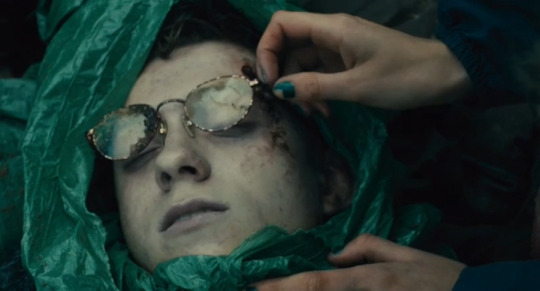
I never... I never realized how much they looked alike. It's... It's not like I forgot him... but.. I pushed the memory so far back"
" I'm sorry Bucky..."
Bucky looks down before reaching to hold Steve's hand.
" We served together for a bit... and I.. we made plans... from when we would escape or get set free..after the war... he was from Upstate somewhere...had a home in the country. With fucking goats, he had a picture of favorite one he kept with him... to remind him of home... he didn't have any family left" he lets out a watery laugh.
Steve, in that moment, realizes what Bucky isn't saying. That Bucky was in love with this fella and made plans on being with him.
And the goats, no wonder when Bucky came out of cyro and he wanted to stay in Wakanda. To live on a small farm with the goats. To rest and be at peace what could have happened. If his partner hadn't of died and he went home with him. Instead of staying and helping Steve, he could of been at peace.
It explains the grief he saw on Bucky's face back when the group was cheering on Captain America. At the time, he thought it was just being overwhelmed with still fighting, of being freed, and now going to head back into the mess. But now... It's clear to Steve. It was survival guilt, of dreams and hope dashed that he got out while he had to leave a body behind. Someone he once saw a future with. There's no point in going home when you buried the closest thing.
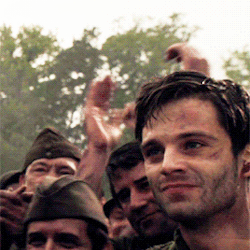
" Oh Buck...."
#writing prompt#the winter soldier#bucky barnes#james bucky barnes#james buchanan barnes#winter solider#i mean you could make it stucky#stucky#wintershield#winterspiderpurrs
27 notes
·
View notes